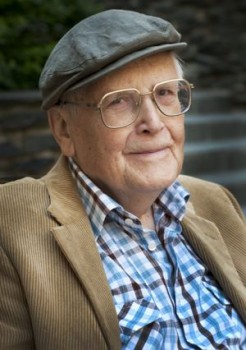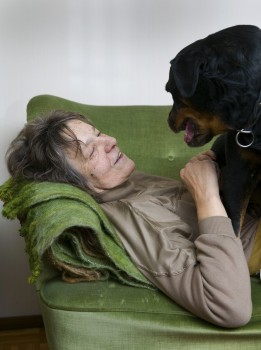Author: Jukka Koskelainen
The stars above
6 March 2014 | Authors, Reviews

Lars Huldén. Photo: Charlotta Boucht
The state of poetry in Finland has been the subject of heated debate in recent years. The focus of much of this attention has been so-called ‘experimental poetry’. Some commentators have gone as far as to suggest that, in its ability to reshape and reinvent itself, contemporary poetry serves as a model for other forms of literature.
In such a literary climate, a writer like Lars Huldén might easily be overlooked, a writer whose poems give honest expression to thoughts and moods. This Huldén achieves in a manner that is at once recognisable and inventive. His poems are, perhaps, close to what many assume poems should be: concise speech expressing the wisdom of experience and often revealing a clear sense of resignation – which is hardly surprising when you have reached the age of 88. More…
Nature girl: on the poetry of Sirkka Turkka
21 January 2010 | Authors, Reviews
Sirkka Turkka writes precise, lucid sentences, as if composing a treatise. But her poems often relate utterly loopy things; the work is playful, frisky. It is not based on explication or hidden themes. When it refers to abstract matters, it always couples them with concrete reality, with natural or everyday occurrences. ‘Trees have the snowy faces of ancestors, and on the road where dogs walk in their wind-blasted trousers, silence eats itself like silk.’
The poems contain numerous allusions to literature and culture, including popular culture. The tone can be parodic in these instances, but not critical; rather, a new point of departure is established, as when Turkka writes about Hamlet in her 1970s collection, Yö aukeaa kuin vilja (‘The night opens like corn’). ‘On long, silent winter days, when his father immersed himself in additional studies or demonstrations of learning, Hamlet would shut himself up in his room in order to rewrite history. He colonised countries and swapped their locations. At one stage he even thought of making the sun rise in the West and America encounter Columbus, but he restrained himself.’ More…
A hole in the landscape
Issue 3/2008 | Archives online, Authors

Tomi Kontio. Photo: Heini Lehväslaiho
Jukka Koskelainen on Tomi Kontio’s new poems
Tomi Kontio (born I966) has often depicted suburban life both scabrously and romantically, a rather rare combination in Finnish literature. Poetically heightened language is not usually connected with apartment-block districts, but Kontio has the ability to zoom from the milk carton on the kitchen table to the Milky Way. It has made him one of Finland’s most read poets.
In his debut volume, Tanssisalitaivaan alla (‘Under the ballroom sky’, 1993), Kontio had a tendency towards a freewheeling, painterly imagery. In Vaaksan päässä taivaasta (‘A span from heaven’, 2006), the volume before the present one, he wrote a series of short narratives about the hard side of living on a housing estate. Kontio has also published children’s books, among other things, and was awarded the Finlandia Junior Prize for his novel Keväällä isä sai siivet (‘In the spring father grew wings’, Tammi, 2000). More…
Abrupt bewitchment
Issue 1/2003 | Archives online, Authors, Reviews
Jouni Inkala (born 1966) published his first collection of poetry in 1992. For some time it seemed that he had already developed his style to the limit, creating an intimate, concentrated tone with a characteristically calm rhythm and a pensive narrative voice. Words and images form a chain, which winds itself round a mystery: something which we can approach and redefine again and again, but which we can never fully apprehend.
In Inkala’s first collection, there are some poems which are so carefully polished, so skilful and considered, that even the dust seems to fall meticulously into place. He has gradually introduced points into his poems at which such control disappears and the writing suddenly ruptures. More…
Poetry and speech
Issue 2/1996 | Archives online, Authors
The poet is condemned to language. He has been forced to abandon the mysterious union between language and reality. In retum, he wants his Iines, at least, to solidify into objects, part of the order of beings, to be like a ready-carved statue. But this does not happen. Language has its own caprice, meanderings and underground life.
The poems of Lauri Otonkoski (born 1959) are not like sculptures. Sometimes they do not even seem like beings among other beings. His poems gape open at the edges, and their ambiguous content emerges to question the composition of the extemal form. Metamorphosis is not the poems’ theme, but their nature: obscure at their limits and constantly changing in form, their reference is far beyond themselves, to a region where the reader must struggle with disturbing shadows and unfinished constructions. More…
-
About the author
Jukka Koskelainen (born 1961) is a poet, translator and literary critic. The first of his three collections of poetry, Kierros (‘Cycle)’ appeared in 1995. He has published collections of essays and several translations of poetry, for example by Octavio Paz and Paul Celan. He lives in Helsinki.
© Writers and translators. Anyone wishing to make use of material published on this website should apply to the Editors.

